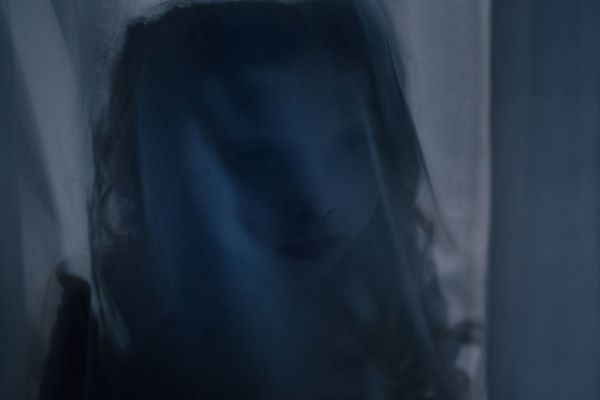For horror fans of a certain age the thought of a child floating at a bedroom window will conjure instantly the image of vampiric Ralphie Glick tapping at a pane of glass in Salem’s Lot. In Ruth Platt’s sombre Martyrs Lane, Leah (Kiera Thompson) a young girl growing up in her father’s vicarage takes the appearance of another girl at her upstairs window at calm face value. The girl (Sienna Sayer) claims to be her guardian angel. She certainly looks cherubic enough to her host, and after all Leah sticks rigidly to the Bible verse in the church hall; “Do not neglect to show hospitality to strangers, for by so doing some people have shown hospitality to angels without knowing it.” Only, the girl insists on playing a game which leads Leah to discover some hidden family secrets, and begins to seem less and less seraphic with each visit.
Platt’s film layers eerie religious iconography on top of a modern fairy tale with Leah’s quest, manipulated by her new friend, having echoes of a kitchen sink Pan’s Labyrinth. It deals in slow dread and the concern the viewer feels for an inquisitive child frequently left to her own devices. Her pastor father (Steven Cree) is too busy tending to his flock to register the repeatedly wandering lamb in his own house. Her own mother (the always excellent Denise Gough) seems to interact with her daughter through a scrim of her own sadness, reluctant to fully engage. While the repeated night time ‘play dates’ between Leah and the angel form the narrative core, the healing of the bond between mother and daughter is its beating thematic heart.
Platt’s story nails a devious irony; that the spiritual environment in which Leah lives indirectly places her in danger. She’s as nourished by the miraculous parables delivered from her father’s pulpit as the grateful souls at the church hall kitchen are by her mother’s soup. Besides Leah’s normal childish capacity to accept information that would have grown adults screaming for an exorcist, it doesn’t occur to her – at first, at least – that guardian angels may not be real. These early scenes between the girls, while uncanny, have the air of an uncanny gothic children’s tale rather than one of outright terror. Both young actors are outstanding, their interactions and dialogue feeling completely natural, and their performances mature without being precocious. Sayer in particular is subtly disturbing as an increasing aggression runs parallel to physical degradation, which sees her bleed from her nose, lose teeth, and display some horrific looking wounds where her ‘real wings’ are growing.
Where Martyrs Lane loses its impact is that the central mystery ceases to remain one, long before it plans to remove its hand. There’s a sense of the melancholy waters of its simple story being artificially muddied, especially when the story adopts the rhythm of night time visit followed by Leah discovering another clue. Is a revelation really a revelation when it is the only conclusion that can possible be drawn? Perhaps it’s because we’re so firmly affixed at Leah’s viewpoint – complete with the gingerbread house menace of the vicarage – that the tone is one of inevitable discover. It also aims for hazy ambiguity at its conclusion, which feels out of step with its otherwise transparently optimistic themes of acceptance and reconciliation.
Despite these narrative missteps, Martyrs Lane is otherwise a gently unsettling and patiently crafted chiller that is high in atmosphere and style. It wears its bleeding, compassionate heart on its sleeve, and benefits immeasurably from superb central performances that will stand far longer in the memory than its occasional structural stumble.
Available on Shudder from Thu Sep 2021
